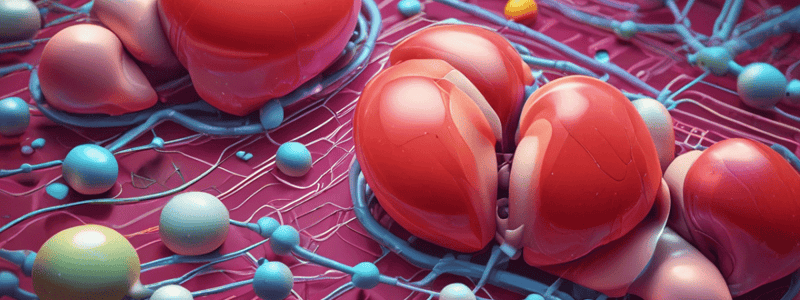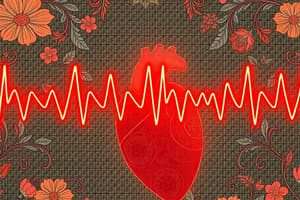Podcast
Questions and Answers
Which class of antiarrhythmic drugs is known for having alpha adrenergic blockade and vagolytic actions?
Which class of antiarrhythmic drugs is known for having alpha adrenergic blockade and vagolytic actions?
- Class IC
- Class IA (correct)
- Class IB
- Class II
Why is disopyramide not recommended for use?
Why is disopyramide not recommended for use?
- High cost and limited availability
- Lack of efficacy and toxicity (correct)
- Potential for drug interactions
- Low bioavailability and rapid metabolism
Which Class IC drug is highly effective at converting atrial fibrillation (AF) to sinus rhythm?
Which Class IC drug is highly effective at converting atrial fibrillation (AF) to sinus rhythm?
- Flecainide (correct)
- Propafenone
- Mexiletine
- Lidocaine
Why are beta-blockers (Class II) used in antiarrhythmic therapy?
Why are beta-blockers (Class II) used in antiarrhythmic therapy?
What is a significant limitation of using procainamide for atrial fibrillation (AF) treatment?
What is a significant limitation of using procainamide for atrial fibrillation (AF) treatment?
Why is the use of encapsulated oral mexiletine for recurrent ventricular tachycardia (VT) prevention not recommended?
Why is the use of encapsulated oral mexiletine for recurrent ventricular tachycardia (VT) prevention not recommended?
Which class of antiarrhythmic drugs works by blocking the effects of catecholamines at beta-adrenergic receptors in the heart?
Which class of antiarrhythmic drugs works by blocking the effects of catecholamines at beta-adrenergic receptors in the heart?
Which class of antiarrhythmic drugs has a low ability to block sodium channels and is used to treat acute ventricular arrhythmias?
Which class of antiarrhythmic drugs has a low ability to block sodium channels and is used to treat acute ventricular arrhythmias?
What is the main adverse effect associated with class IA antiarrhythmics?
What is the main adverse effect associated with class IA antiarrhythmics?
Which type of blockade is state dependent for lidocaine-like agents in class IB antiarrhythmics?
Which type of blockade is state dependent for lidocaine-like agents in class IB antiarrhythmics?
What is the mechanism of action of class II antiarrhythmics in treating arrhythmias?
What is the mechanism of action of class II antiarrhythmics in treating arrhythmias?
Which effect do beta blockers cause in the heart, leading to a reduction in the heart's oxygen demand?
Which effect do beta blockers cause in the heart, leading to a reduction in the heart's oxygen demand?
What is the main limitation of Vaughan Williams' classification system for antiarrhythmic drugs?
What is the main limitation of Vaughan Williams' classification system for antiarrhythmic drugs?
What is the primary use of Class IB antiarrhythmics like Lidocaine?
What is the primary use of Class IB antiarrhythmics like Lidocaine?
Why are beta blockers used under careful observation for changes in rhythm?
Why are beta blockers used under careful observation for changes in rhythm?
Which class of antiarrhythmic drugs is contraindicated following myocardial infarction (MI)?
Which class of antiarrhythmic drugs is contraindicated following myocardial infarction (MI)?
What is the primary concern with class II antiarrhythmic agents?
What is the primary concern with class II antiarrhythmic agents?
Which class of antiarrhythmic drugs is known to delay repolarization?
Which class of antiarrhythmic drugs is known to delay repolarization?
Which antiarrhythmic drug is considered most effective for atrial fibrillation?
Which antiarrhythmic drug is considered most effective for atrial fibrillation?
What is the primary mechanism of action of Class IV antiarrhythmics?
What is the primary mechanism of action of Class IV antiarrhythmics?
Why are beta blockers considered a first-line treatment for myocardial infarction patients?
Why are beta blockers considered a first-line treatment for myocardial infarction patients?
Which action characterizes the effect of Class III antiarrhythmics on myocytes?
Which action characterizes the effect of Class III antiarrhythmics on myocytes?
Why are Class IV antiarrhythmics generally contraindicated in patients with left ventricular dysfunction?
Why are Class IV antiarrhythmics generally contraindicated in patients with left ventricular dysfunction?
What is the primary concern with using Amiodarone for atrial fibrillation?
What is the primary concern with using Amiodarone for atrial fibrillation?
Which drug has a decreased usage due to proarrhythmic effects and perception changes about risks and benefits?
Which drug has a decreased usage due to proarrhythmic effects and perception changes about risks and benefits?
Why are Class III antiarrhythmics considered less susceptible to proarrhythmia compared to Class I agents?
Why are Class III antiarrhythmics considered less susceptible to proarrhythmia compared to Class I agents?
What is the mechanism of action of Beta-blockers in arrhythmias?
What is the mechanism of action of Beta-blockers in arrhythmias?
How do Calcium Channel Blockers affect the AV node in arrhythmias?
How do Calcium Channel Blockers affect the AV node in arrhythmias?
What is the primary mechanism of action of Digoxin in supraventricular arrhythmias?
What is the primary mechanism of action of Digoxin in supraventricular arrhythmias?
Why are Potassium Channel Blockers classified as Class III antiarrhythmic drugs?
Why are Potassium Channel Blockers classified as Class III antiarrhythmic drugs?
What is a common limitation of Beta-blockers in acute arrhythmias?
What is a common limitation of Beta-blockers in acute arrhythmias?
How do Calcium Channel Blockers affect myocardial contractility?
How do Calcium Channel Blockers affect myocardial contractility?
Flashcards are hidden until you start studying




